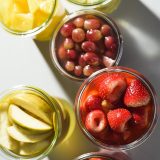The moment Noa Berman-Herzberg, the “serial pickler,” opened the door to her spacious apartment in Tel Aviv, I realized that her love of pickling transcended food.
With long corkscrew blond hair, bright red lipstick, large, inquisitive eyes and a writer’s obsession with life’s disappointments, Berman-Herzberg brings together sour food and sour stories. At her hachmatza-themed events, guests eat her pickles and tell their stories about missed opportunities. In Hebrew, hachmatza means both “pickling” and “missed opportunity,” both derived from the root “going sour.”
Seated on her sofa, after tasting 22 pickles—everything from Syrian plums to Thai beans and fennel—she tells me that she uses two different types of pickling liquid: one with vinegar, a bit of salt and sugar (a quick 24-hour brine) and the other a more typical salt brine that produces fermentation and takes 30 days. She also favors vodka as a chaser. On this day, it was a borscht-flavored version, small shot glasses lined up and refilled at a brisk pace.
My favorite pickles were the quick fruit-based samples and so, back at Milk Street, we followed Berman-Herzberg’s basic formula—rice vinegar, sugar and salt—and then played with additional flavorings, including lemon and lime zest and cardamom.
We preferred giving the fruit 48 hours to pickle and went through a wide range of options, including strawberries, pineapple, apples, grapes, melons and plums. It is a clever, easy way to add a burst of flavor to sweet and savory dishes—everything from curries and pork chops to ice cream.




